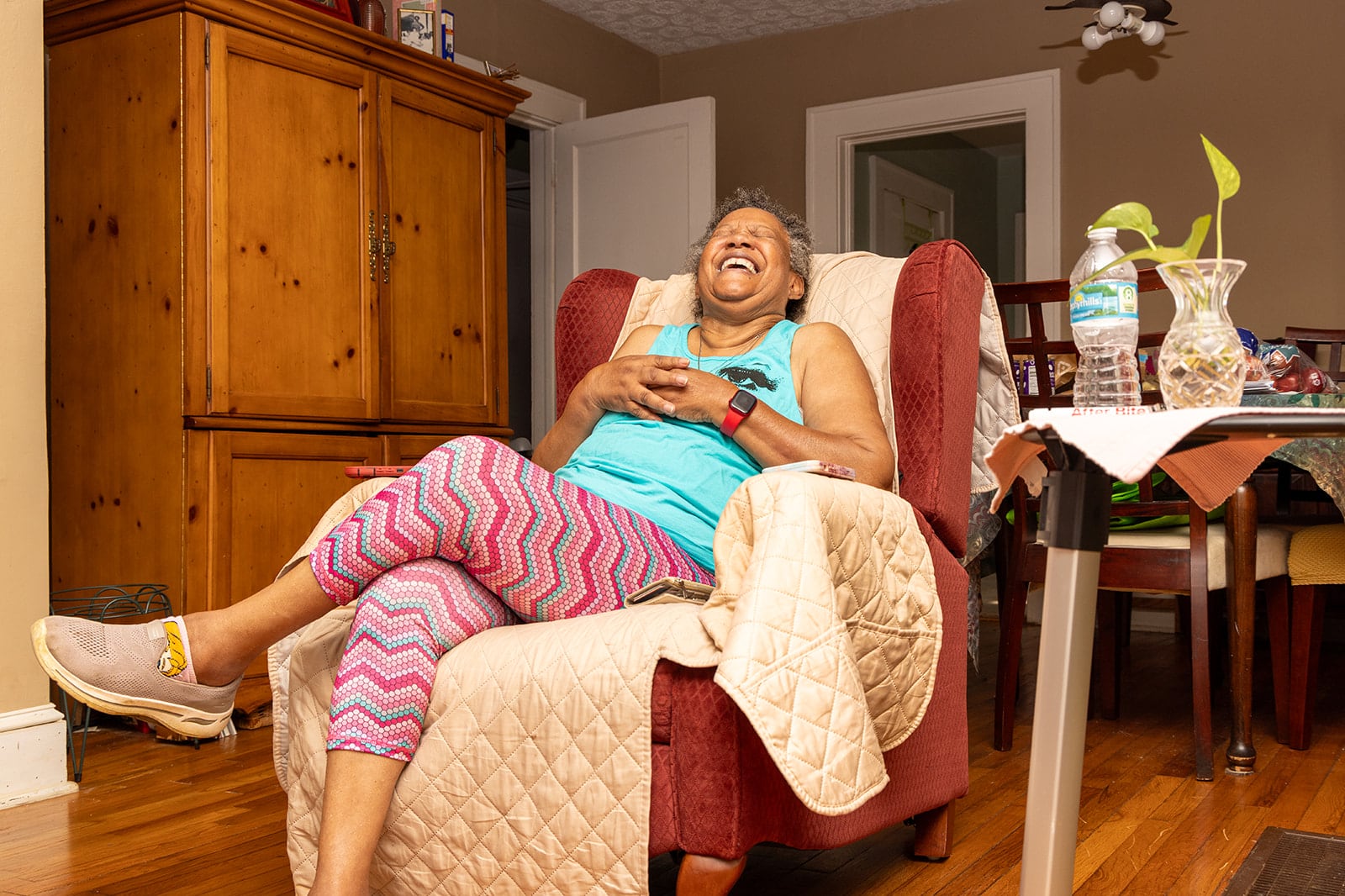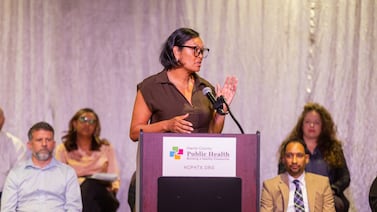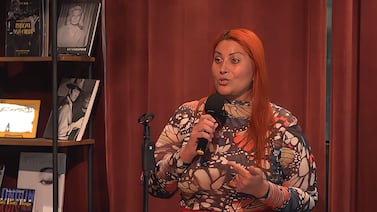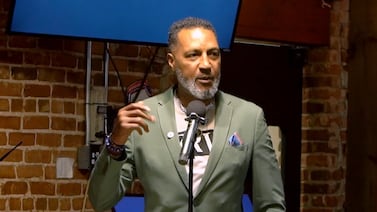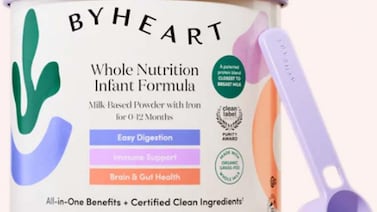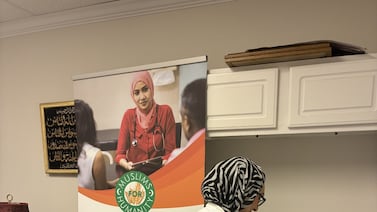Public health, explained: Sign up to receive Healthbeat’s free Atlanta newsletter here.
Can a photograph improve public health? A project in East Point, Georgia, a small city with a population of around 38,000 just south of Atlanta, aims to prove that it can.
A recent exhibit at the city’s Arts Xchange shared photos and comments illustrating how the people of East Point view health in their community.
The pictures depict potholes in roads and a shuttered hospital, but also the natural beauty of a local waterfall and joy shared among neighbors.
Placed alongside the photos are quotes from residents about the challenges they face paying bills and raising children, how housing affects health, and how the arts promote mental health in people of all ages.
The exhibit is part of a partnership between the city and Morehouse School of Medicine that started in 2021. The goal is to promote policies that improve health equity in a city inextricably shaped by past racial inequalities. The project is supported by a three-year, $1.2 million grant from the U.S. Department of Health and Human Services.
Morehouse School of Medicine chose to focus on East Point because of its history of structural racism, poor health outcomes, and city leaders’ commitment to health equity, said Megan Douglas, a Morehouse School of Medicine associate professor who spearheads the partnership.
The project started with traditional research, including surveys, focus groups, and interviews with key policy makers. But something was missing: the voices and experiences of regular people, Douglas said.
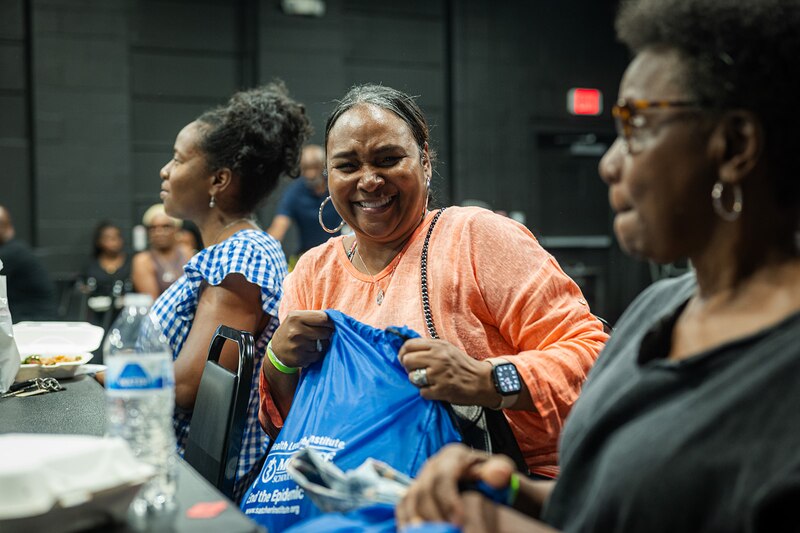
Photovoice aims to spotlight public health
The team turned to Photovoice, a research method created in the 1990s, when researchers asked women in rural China to document their lives for a year to better explain their needs and experiences to policymakers.
Photovoice uses photography and storytelling rather than the typical public health methods that use statistics and surveillance.
It shows that art can be an essential tool for public health, said Douglas and exhibit curator Monica Ponder, an assistant professor of health communication at Howard University.
“Sometimes the impact of that work can get flattened when you just look at numbers …. Photovoice is a way to give the community an opportunity to speak,” Douglas said.
The researchers hired East Point photographer Chanda Scott to shoot photos of 31 people in the community. Scott and Ponder also interviewed them about their views on health in East Point.
“Communities are always speaking to us,” said Ponder, who lives in Southwest Atlanta. “Are we listening?”
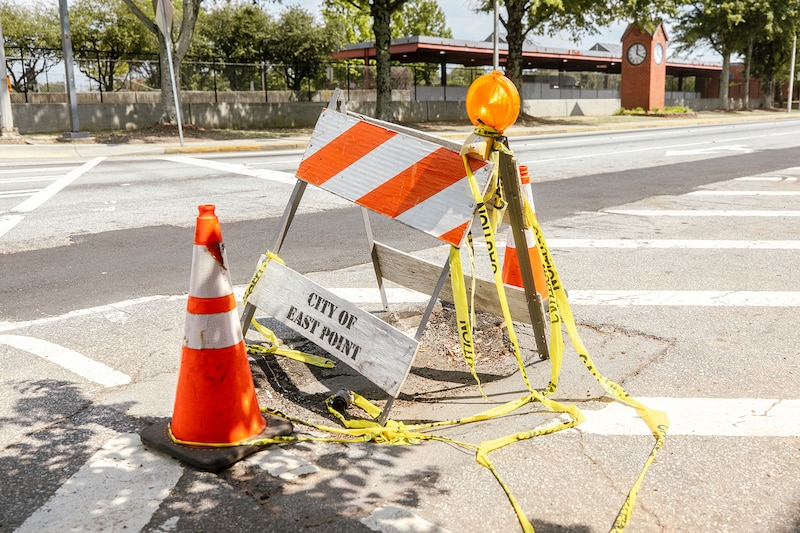
“Communities are always speaking to us .... Are we listening?”
— Monica Ponder, exhibit curator
“The arts and opportunities like this are a great way to layer on and complement what we know quantitatively through surveillance systems and surveys,” added Ponder, who is trained as an epidemiologist and formerly worked at the U.S. Centers for Disease Control and Prevention. “We’re dealing with so many challenges in today’s society, you have to bring in art and the stories and these almost non-traditional ways of knowing.”
Residents, too, recognized that numbers can’t tell the full story.
“Sometimes data leaves out individuals and people because data really can’t speak to the emotional component,” says one comment in the exhibit.
The exhibit features Scott’s photographs alongside unedited, anonymous comments from residents that help illustrate what’s happening in the community.
Photos add context to public health debate
Many East Point residents lack nearby options for fresh and healthy foods, Douglas said. One analysis found the area has many convenience marts, which are usually short of produce, and only a few large grocery stores. About 20% of residents live in poverty, according to the U.S. Census Bureau.
But those facts don’t tell the whole story, Douglas said. The exhibit’s photo of the local Piggly Wiggly alongside residents’ comments add nuance to what it’s like to live in an area with few healthy food options.
“The Piggly Wiggly, the offerings are pretty much, I’m going to say about 70% processed foods in big packaging,” one participant said.
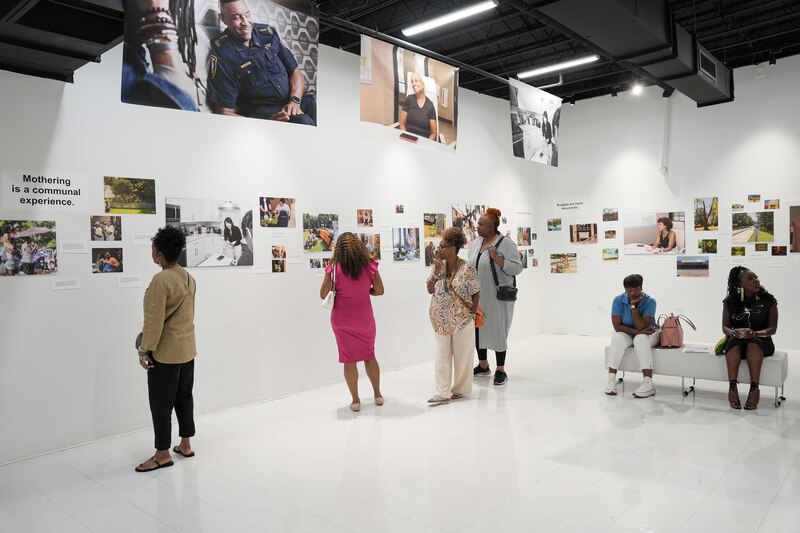
“I’m like, okay, we’re trying to stay alive for a lot longer. We cannot only have McDonald’s and Burger King and Wendy’s and Popeye’s here repeatedly,” another said.
Other images show residents cooking together and buying and selling fresh produce, highlighting the city’s “robust urban farming community” and pointing toward assets the city could build upon to improve food access.
The Morehouse School of Medicine-East Point partnership aims to increase residents’ awareness of and participation in health policymaking, Douglas said, with the goal of driving bottom-up rather than top-down health policy change.
For that reason, the exhibit did not have one specific policy target; the purpose was to spark conversation and share stories that can inform subsequent policy decisions.
Mayor Deana Holiday Ingraham attended the exhibit, which traces the life cycle of an East Point resident, beginning with comments from and photos of some of the city’s youngest residents, moving on to the experience of being a young adult and having a family, and then turning to adults who want to grow old there.
Several photos show a group of older women exercising. They represent older women who wanted to continue to live in East Point but face difficulties maintaining their homes.
“Finding community became very important, almost a matter of life and death,” Ponder said, and one way these women have done that is by exercising together regularly in a mall parking lot.
Another part of the exhibit focuses on a lack of access to health care, especially since the closing of Wellstar Health System’s hospital in South Fulton in 2022. Hospital CEO Candice Saunders pointed to low hospital admission rates and staff shortages as reasons for the closure. Almost 17% of East Point residents are uninsured, according to the U.S. Census.
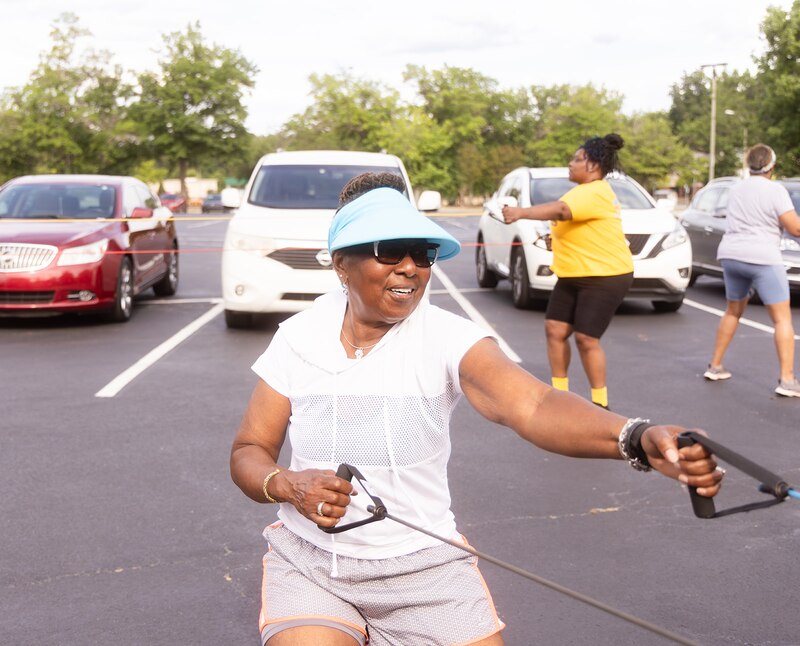
The area is not entirely without health care — Morehouse School of Medicine opened an East Point clinic last year, and nonprofit Southside Medical Center also serves the community — but residents must travel to Grady Memorial Hospital or other Atlanta hospitals if they need emergency care.
“When you don’t have access to health care, that means you have access to death,” one comment reads.
“To me [health equity] means that you would like for the community to actually be healthy … in a way where you don’t have to go searching for facilities,” another said.
The city’s struggles with health are informed by a long history of racial inequities.
In 1912, the city council adopted an ordinance requiring all Black citizens to live in the part of town bordering oil and fertilizer plants, dubbed “Stinktown.”
More than a century later, that neighborhood now has some of the worst health outcomes in the city, including the lowest life expectancy and highest rates of diabetes and hypertension, Douglas said.
“It is decisions like that made over a century ago that still have lasting impacts on people’s health today,” Douglas said.
People want to stay in East Point
It’s not all bad, though. The exhibit also highlights what residents value about their community:
“I don’t want to leave East Point.”
“I love smiling Black faces.”
“It feels like family reunion sometimes.”
Photovoice can help facilitate hard conversations by adding context to community conflicts, Douglas said.
For example, residents are split over whether East Point should continue to sponsor “Wednesday Wind Down,” an outdoor music event. Some love the event, while others say the city should use its resources for other needs, like fixing speed bumps.
“I derive a lot of joy from being outside and listening to the tunes I grew up on with my husband,” said one resident.
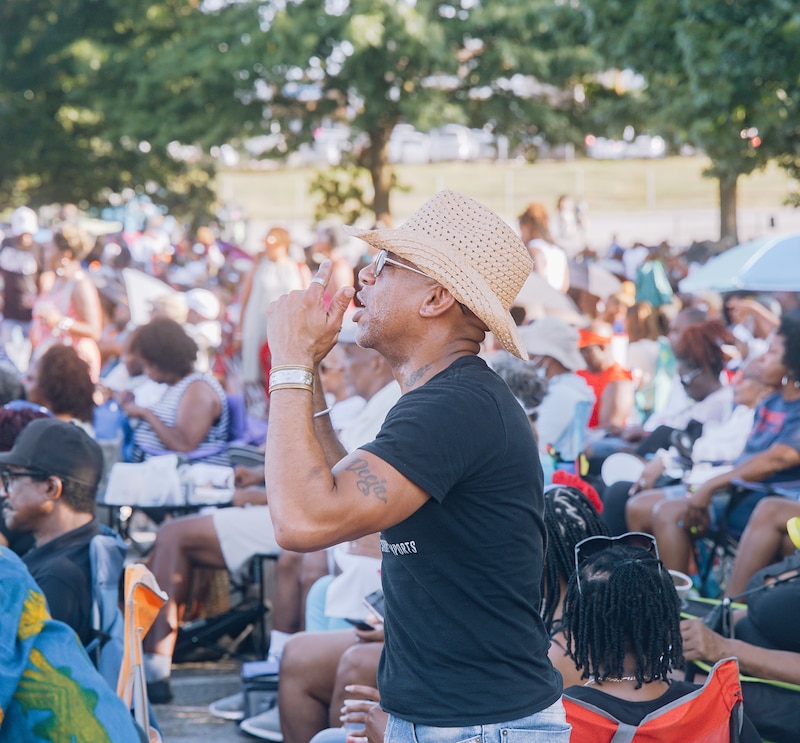
“Most of us are in survival mode half the time … So to get outside on a beautiful day on a blanket [is a good thing],” said another.
Hearing those voices and seeing the images of people enjoying the event can help with hard conversations by exposing “what’s really under the surface,” Ponder said.
The exhibit gave residents whose voices otherwise might have been unheard – because they are working during evening city council meetings, for example – a chance to express their opinions.
“When you have an exhibit where all the voices and opinions can be in one place, and [with] photos, now it’s leveled the bullhorn a bit,” Ponder said.
What’s next for Photovoice exhibit?
Increasing knowledge about health equity among residents and leaders is one of the key goals of the partnership between East Point and Morehouse School of Medicine, Douglas said. The Photovoice method was much more effective than other methods the team tried, like hosting “Health Equity 101” seminars on Saturday afternoons.
Ponder agreed, adding the exhibit and other tools like social media are “how you actually connect with people and keep them engaged.”
The exhibit has so far had a relatively short life, showing for only one week at the Arts Xchange because another exhibit is scheduled for next week. But Ponder and Douglas that the exhibit will live on. They would love to remount it for a longer showing, or take it to other parts of the city or state.
They’re also considering setting up smaller exhibits that feature parts of the show at locations like the city hall or the Morehouse School of Medicine’s clinic in East Point.
“This is what public health should do … This is also our work, not just, you know, being paternalistic and making sure people take their shots, their medicines,” Ponder said. “Let’s find joy together.”
Rebecca Grapevine is a reporter covering public health in Atlanta for Healthbeat. Contact Rebecca at rgrapevine@healthbeat.org.

